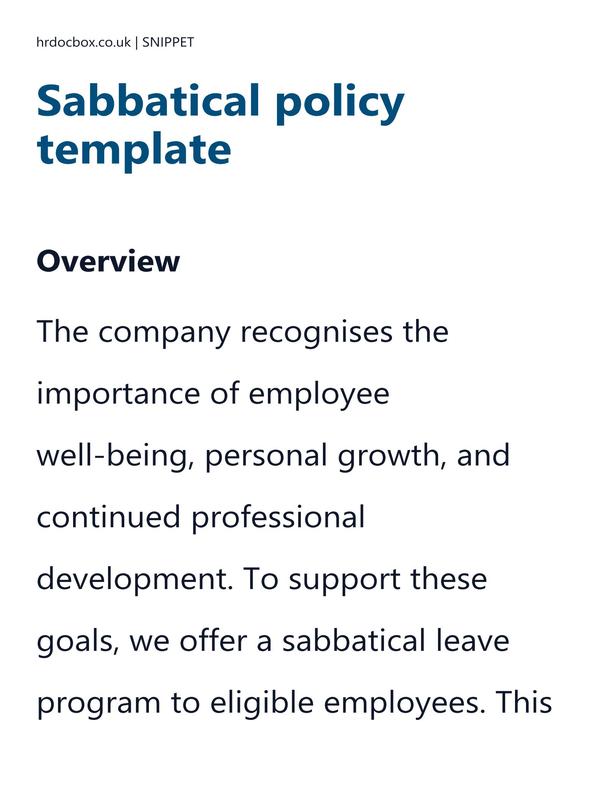Sabbatical policy template


Our Sabbatical Policy Template empowers employees to take a break for personal growth, reducing burnout and enhancing long-term productivity.
- Includes Sabbatical policy template, plus 12 months’ access with all updates provided free of charge and notified to you.
- UK-specific accuracy.
- 531 words over 2 pages.
- Last updated 07/02/2026.
- Format: Word / plain text / email.
- Delivery: Instant download after purchase (no physical item).
- Access: Download link shown here after checkout.
- This Sabbatical policy template will SAVE you up to 1 hour 30 mins drafting & research. Save cost. Reduce risk.
Sabbatical policy
1 Overview
1.1 The company recognises the importance of employee well-being, personal growth, and continued professional development. To support these goals, we offer a sabbatical leave program to eligible employees. This policy outlines the guidelines, eligibility criteria, application process, and expectations associated with taking a sabbatical leave.
2 Scope
2.1 This policy is applicable to all employees of [Company].
3 General principles
3.1 All full-time employees who have been employed with the company for a minimum of [insert number of years] years are eligible to apply for a sabbatical.
3.1 Length of Sabbatical
3.1.1 Eligible employees may take a sabbatical for a minimum of [insert number of weeks or months] and a maximum of [insert number of weeks or months]. The length of the sabbatical will be determined by the employee's proposed plan and its relevance to their role at the company. Requests for extensions will be considered on a case-by-case basis.
3.2 Application Process
Employees interested in taking a sabbatical leave must submit a written application to their immediate supervisor
This is a 30% preview of the Sabbatical policy template. For instant full access, purchase this item or a parent bundle.
Sabbatical policy template purpose
A sabbatical policy is a set of guidelines and procedures that an organisation establishes to allow its employees to take an extended period of time off from work for personal or professional development, travel, research, or other purposes. Typically, a sabbatical is a period of leave that is granted after a certain number of years of service to the organisation.
Sabbatical policies may vary between organisations, but they typically include provisions for the duration of the leave, the eligibility requirements, the application process, and the compensation or benefits that the employee will receive while on leave. Some sabbatical policies may require the employee to use the time to engage in activities that are related to their job or field of expertise, while others may allow more flexibility in the types of activities that the employee can pursue.
Sabbatical policies are often seen as a way for employers to retain and motivate their top employees, as well as to encourage personal and professional growth. Sabbaticals can also be beneficial for employees, as they provide an opportunity to recharge, learn new skills, and pursue personal interests.
Practical application of a Sabbatical policy template
- Issue the Sabbatical policy template during onboarding / after changes / planned refresher.
- Send it to appropriate internal recipients such as employees, workers, contractors etc. and request confirmation that is has been read and understood.
Compliance
Compliance
This Sabbatical policy template incorporates relevant UK laws and HR standards, including those listed below:
While there is no specific UK employment legislation dedicated solely to sabbaticals, several existing laws can support the implementation of a sabbatical policy. Here are some relevant ones:
-
Employment Rights Act 1996: Provides the legal framework for different types of leave, such as unpaid leave or career breaks.
-
Working Time Regulations 1998: Ensures compliance with working time limits, rest breaks, and rest periods, which can impact sabbatical arrangements.
-
Equality Act 2010: Prevents discrimination in granting sabbatical opportunities to employees with protected characteristics.
-
Flexible Working Regulations 2014: Enables employees to request flexible working patterns, potentially accommodating sabbatical arrangements.
-
Time Off for Study or Training: Allows employees to request time off for study or training purposes, which could align with sabbatical goals.
-
Collective Agreements: If applicable, any relevant collective agreements negotiated between employers and trade unions might include provisions related to sabbaticals.
Frequently Asked Questions about a Sabbatical policy template
Frequently Asked Questions about a Sabbatical policy template
-
Can I use the Sabbatical policy template in my small business?
Yes. The Sabbatical policy template is designed to be flexible and suitable for organisations of all sizes, including small businesses and charities. It follows UK employment law best practice, so even if you don't have an in-house HR team, you can confidently apply it.
-
Is the Sabbatical policy template compliant with 2026 UK employment law?
Absolutely. Like the Sabbatical policy template, all of our templates are drafted with the latest ACAS guidance and UK employment legislation in mind. We review and update them regularly, so you can be confident they remain compliant.
-
Can I customise the Sabbatical policy template for my organisation?
Yes, we highlight the areas of the Sabbatical policy template that you need to update with your own details, and where you need to make decisions to suit your situation. This saves you time and ensures that you meet best practice.
-
Do I get instant access to the Sabbatical policy template?
Yes. Once purchased, you'll be able to download the Sabbatical policy template instantly. Templates are provided in editable Word or Excel format so you can customise them easily, and in PDF format for easy sharing.
-
What if I need more help, not just a Sabbatical policy template?
If you're looking for broader support, we also offer toolkits and library bundles that include the Sabbatical policy template, along with other HR templates and policies for fully managing your situation. These may be more cost-effective if you need deeper advice.
-
Why should I use this Sabbatical policy template, and not AI to generate it?
The risk of using a free AI-generated template 'without review' includes your legal exposure, missing context, and no awareness of the wider process, whereas purchasing the Sabbatical policy template from us mitigates that risk.
